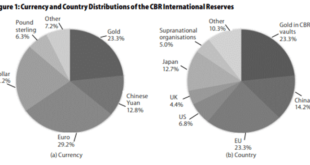T. Sabri Öncü and Güney DüzçayThis article first appeared in the Indian journal, Economic & Political Weekly, on 14 September 2024. Güney Düzçay ([email protected]) and T. Sabri Öncü ([email protected]) are economists based in Türkiye.Historically, central banks, like the Bank of England, were primarily established to finance wars and manage government finances—serving as the “government’s bank.” Later, they evolved to address commercial and financial crises through their role as lenders...
Read More »A War No One Can Win – Ukraine and the Weaponisation of Everything
This article first appeared in the Indian journal Economic and Political Weekly on 19 March 2022. Russian Invasion of Ukraine The Russian invasion of Ukraine started on 24 February 2022. Since then, several thousand combatants from both sides and more than 500 Ukrainian civilians have died, bombs have ruined many cities, and more than two million Ukrainians, half of them children, left the country to become refugees. And the sweeping sanctions the West imposed on Russia in response not only...
Read More »A War No One Can Win – Ukraine and the Weaponisation of Everything
This article first appeared in the Indian journal Economic and Political Weekly on 19 March 2022.Russian Invasion of UkraineThe Russian invasion of Ukraine started on 24 February 2022. Since then, several thousand combatants from both sides and more than 500 Ukrainian civilians have died, bombs have ruined many cities, and more than two million Ukrainians, half of them children, left the country to become refugees. And the sweeping sanctions the West imposed on Russia in response not only...
Read More »A War No One Can Win – Ukraine and the Weaponisation of Everything
This article first appeared in the Indian journal Economic and Political Weekly on 19 March 2022.Russian Invasion of UkraineThe Russian invasion of Ukraine started on 24 February 2022. Since then, several thousand combatants from both sides and more than 500 Ukrainian civilians have died, bombs have ruined many cities, and more than two million Ukrainians, half of them children, left the country to become refugees. And the sweeping sanctions the West imposed on Russia in response not only...
Read More »Quantitative Easing: how the world got hooked on magicked-up money
Going cold turkey would finish off a dysfunctional global financial system that’s now hopelessly addicted to emergency infusions. The only solution is surgery on the system itself. This article first appeared in Prospect magazine on 16 July 2021. The world economy is a mess. The system, notionally governed by the invisible hand of the market, is no longer governed in any meaningful way: private excess puffs up bubbles that government indulgence ensures can never burst. We seem condemned to...
Read More »Quantitative Easing: how the world got hooked on magicked-up money
Going cold turkey would finish off a dysfunctional global financial system that’s now hopelessly addicted to emergency infusions. The only solution is surgery on the system itself.This article first appeared in Prospect magazine on 16 July 2021. The world economy is a mess. The system, notionally governed by the invisible hand of the market, is no longer governed in any meaningful way: private excess puffs up bubbles that government indulgence ensures can never burst. We seem condemned to...
Read More »Quantitative Easing: how the world got hooked on magicked-up money
Going cold turkey would finish off a dysfunctional global financial system that’s now hopelessly addicted to emergency infusions. The only solution is surgery on the system itself.This article first appeared in Prospect magazine on 16 July 2021. The world economy is a mess. The system, notionally governed by the invisible hand of the market, is no longer governed in any meaningful way: private excess puffs up bubbles that government indulgence ensures can never burst. We seem condemned to...
Read More »The case for an Ecological Interest Rate
Between the Anglo-American political horror shows of 2020 and the raging pandemic, something much less theatrical drifted centre stage to play a more than usually important role: interest rates. There is one obvious reason: like waiting to witness a rare celestial event there is a high likelihood that rates will do a shocking, unusual thing and go negative. But there is another important reason that hasn’t, to date, been part of mainstream economic commentary. With more focus than ever on a...
Read More »The case for an Ecological Interest Rate
Between the Anglo-American political horror shows of 2020 and the raging pandemic, something much less theatrical drifted centre stage to play a more than usually important role: interest rates. There is one obvious reason: like waiting to witness a rare celestial event there is a high likelihood that rates will do a shocking, unusual thing and go negative. But there is another important reason that hasn’t, to date, been part of mainstream economic commentary. With more focus than ever on a...
Read More »The case for an Ecological Interest Rate
Between the Anglo-American political horror shows of 2020 and the raging pandemic, something much less theatrical drifted centre stage to play a more than usually important role: interest rates. There is one obvious reason: like waiting to witness a rare celestial event there is a high likelihood that rates will do a shocking, unusual thing and go negative. But there is another important reason that hasn’t, to date, been part of mainstream economic commentary. With more focus than ever on a...
Read More » Heterodox
Heterodox


